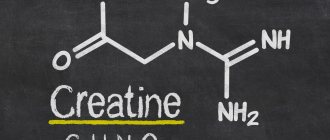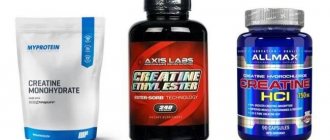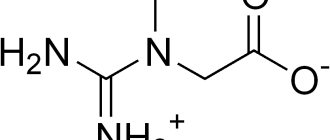Description of glutamine and its actions
Glutamine is an amino acid necessary for muscle growth. This is the main component of protein. For the body of people involved in sports, this supplement is necessary to stimulate the functioning of the immune system. The amino acid accumulates in muscle cells.
The substance is found in foods such as cabbage, fish, beef, eggs, sugar beets, spinach and dairy products.
Benefits for the body:
- restoration of immunity;
- accelerating the recovery process after training and competitions;
- energy replenishment;
- suppression of dissimilation;
- preventing fatigue;
- balanced glucose levels;
- growth stimulation;
- improving body parameters
The drug does not cause side effects and has no age restrictions.
How to take glutamine with creatine
Athletes who train daily often take glutamine along with another effective supplement: creatine. It is a carboxylic acid essential for increasing physical strength and endurance.
The combination of glutamine and creatine will satisfy the fluid needs of muscle cells. When the muscles become unable to respond to the cretin entering the body, they remain susceptible to the absorption of glutamine.
Be sure to drink creatine with sweet tea or compote; it is important that the drink contains glucose, this will facilitate its absorption. After exercise, take the second part of the dose of creatine and, accordingly, after 20 minutes of glutamine
Description of creatine and its actions
Creatine participates in the body's metabolic processes (energy exchange in nerve and muscle fibers). It is responsible for supplying the muscles with energy during periods of active exercise. Taking the supplement increases the level of phosphocreatine, which promotes speedy recovery and increased muscle endurance.
The substance gives:
- Increase in strength data.
- Multiplication of muscle mass.
- Increases stamina.
- Has a beneficial effect on the recovery process after exercise.
- Improves body contour and muscle quality.
- Blocks the reproduction of lactic acid.
It increases activity and helps eliminate depression. Has a beneficial effect on the nervous system. Supplements are in demand by all athletes, but most athletes are vegetarians. Supplements fully provide the body with the necessary substances, in a way that they do not receive it from food. Thanks to this, if used correctly, it is possible to lose extra pounds.
What is it needed for
In bodybuilding and powerlifting, L-glutamine has become widely used as a means of accelerating muscle metabolism and helping to recover faster after the most difficult workouts. It is recommended for those who suffer from high blood pressure and those who want to build muscle mass in a short time. However, these are not all of its positive properties.
For the human body, the benefits of amino acids are undeniable, since they perform many vital functions:
- participates in nitrogen metabolism and redox reactions, promotes the synthesis of other amino acids (for example, histidine), nucleic acids, aminobenzoic acid, vitamin B9, serotonin;
- blocks the harmful properties of ammonia, which breaks down muscle fibers;
- used by cells to produce energy (can compete in this even with glucose);
- normalizes hormonal levels;
- increases the permeability of muscle fibers for potassium ions, accelerates muscle recovery, reduces soreness by 80%, prevents overtraining syndrome;
- strengthens the immune system;
- prevents the development of cardiovascular diseases;
- provides an anti-catabolic effect, suppresses cortisol production, protects against stress;
- improves digestion;
- minimizes the risk of non-alcoholic fatty liver disease.
In recent years, many studies have been published regarding the uselessness of glutamine in sports nutrition. In particular, these are the works and conclusions of the following scientists:
- Wilkinson, Kim, Armstrong found that glutamine is not involved in protein production, and therefore cannot increase muscle mass;
- two separate groups of researchers (Burke and Davidson, as well as Jose and Sanders) immediately concluded that it has no effect on improving indicators such as strength and endurance;
- Williams denied that it relieves overtraining syndrome and strengthens the immune system.
Based on the published data, faith in it was shaken, sales decreased significantly. Refutations of the criticism followed soon after. In particular, a study from Oxford University proved that the amino acid still reduces the risk of infection and activates immune cells. Sergey Shelestov, master of sports in bodybuilding, professional IFBB bodybuilder, gave good advertising to the drug. Among the variety of sports nutrition, he singles out L-glutamine, emphasizing its high effectiveness.
It turns out that the theory (results of published studies) and practice (reviews of many bodybuilders, including Shelestov) of the use of L-glutamine diverge. Therefore, you have to choose between them and decide whether to use the drug or not.
Rules for joint reception
Experts recommend taking approximately 10 grams of glutamine per day. This dosage is divided into 5 milligrams into two doses.
For example, taking after exercise and at night:
- at the end of training, a process of suppression of muscle growth and catabolic hormones is necessary;
- Before going to bed, the production of night-time growth hormone increases. During periods when there is no training, it should be consumed at lunch and at night;
- Creatine is taken before training and 5 milligrams each. On a free day, reception is morning and evening;
Joint use is necessary for full effect, since glutamine transports creatine, the required effect is achieved.
Glutamine: when, in what quantity and with what to take?
Glutamic acid (glutamine) is found in huge quantities in human muscle tissue. That is why this amino acid is the most suitable means for muscle recovery and supercompensation for their destruction, which is usually observed during intense physical activity during training. At the same time, numerous studies conducted by biologists and physiologists in different countries of the world do not prove that at least some positive results are obtained from taking glutamine in this regard. Therefore, there have long been serious contradictions between specialists and athletes.
The effect of glutamine on the human body is not as simple as it might seem at first glance. Biologists conduct tests based only on highly targeted analyses. At the same time, recently conducted larger studies have demonstrated that taking glutamic acid allows you to trigger many physiological processes in the human body (and not one of them is associated with the formation of muscle fibers).
So what are these processes and are they necessary? One of the most important processes triggered when taking glutamine in an amount of 5 g is the increased production (by more than 400%) of somatotropin (growth hormone) after a few hours. After some time, the somatotropin content returned to its original values.
Moreover, within 2.5 hours, when the level of somatotropin was increased, the human body received high doses of growth hormone, which suggests the launch of processes of increasing muscle mass, reducing body fat, and increasing sexual attractiveness. It also allows you to improve a person’s mood, memory, attentiveness, and improve the functioning of the immune system.
Another study was conducted in which subjects were given glutamic acid in a protein drink. In this case, there was also an increase in somatotropin levels, but “only” by 130% within 1 hour. Therefore, we can conclude that the protein mixture impairs the absorption of glutamine in the human body.
However, glutamine has been shown to improve the effectiveness of a number of functions for which other amino acids are responsible. For example, when taking glutamine in combination with creatine, you can see an increase in the level of positive nitrogen balance (when compared with taking the same amount of creatine, but without glutamine). This allows, in particular, to increase performance during leg press exercises. Glutamine should only be taken to enhance the effects of creatine.
You can give an approximate method of taking and dose of glutamine:
- 5 g twice daily on an empty stomach (not to be mixed with protein supplements).
- The first serving should be taken 30 minutes before training in combination with creatine, or in combination with creatine in the morning on a day when no training is planned.
- The second portion should be taken before bedtime along with BCAAs, because somatotropin begins to be actively produced during sleep, and glutamine improves its production.
Contraindications
Supplements affect the body in one way or another, which means there are contraindications. The products are not completely safe and may not be suitable for everyone.
Contraindicated for persons:
- Which are not related to physical activity. They have sufficient levels of these substances. Taking medications may cause an overdose.
- Supplements can cause exacerbations of diseases; if there is kidney dysfunction, anemia, or emotional excitability, use is not recommended.
- If other dietary supplements are used at the same time, this leads to upset of the digestive system, as well as nervous overexcitation and dry mouth.
- When taking medications, it is not recommended to use the amino acid, otherwise the desired therapeutic effect will not occur.
Important! If you take dietary supplements uncontrollably, then there is a high probability of all sorts of complications. Before using them, consultation with a specialist is necessary.
Safety and toxicity
Scientists have calculated the maximum safe daily dose of glutamine that can be taken without harm to health, without fear of side effects, namely 14 g/day in the form of a dietary supplement (in addition to the glutamine contained in food). People have taken and tolerated higher doses well, but it is not entirely known whether side effects in this case will appear after some time or not. According to limited data, taking 50-60g of glutamine daily for several weeks does not cause any serious side effects. It should be noted that doses of approximately 0.75 g/kg can increase the concentration of ammonia in plasma above the permissible limit. An experiment in older adults (aged 69+/-8.8 years) who took 0.5g/kg glutamine orally daily found no effect on plasma ammonia concentrations, but did detect abnormal changes in serum urea and creatinine levels. In addition, the subjects' glomerular filtration rate of the kidneys temporarily decreased.
How to choose supplements
These are the two most common additives. Today you can find reliable data that both substances are effective and give demonstrable results. How to choose the right product depends on the desired effect, advice from a specialist, or a trainer. They are taken together and separately. It depends on the destination.
This sports nutrition popularly provides the body with sufficient energy, strengthens the immune system, and builds muscle endurance. It is important to determine the dosage and dosage regimen under the supervision of a professional trainer.
Glutamine
Glutamine is the most abundant amino acid in muscles, essential for recovery, accelerating metabolic processes and suppressing cortisol secretion. Although the body can generally produce glutamine on its own, it is unable to produce it in sufficient quantities to cope with intense training. Even though overall protein intake may be high to meet exercise needs, adding extra glutamine to the diet will help with better and faster muscle recovery. According to the University of Maryland Medical Center, not getting enough glutamine after intense exercise can lead to decreased immune system function and colds.











